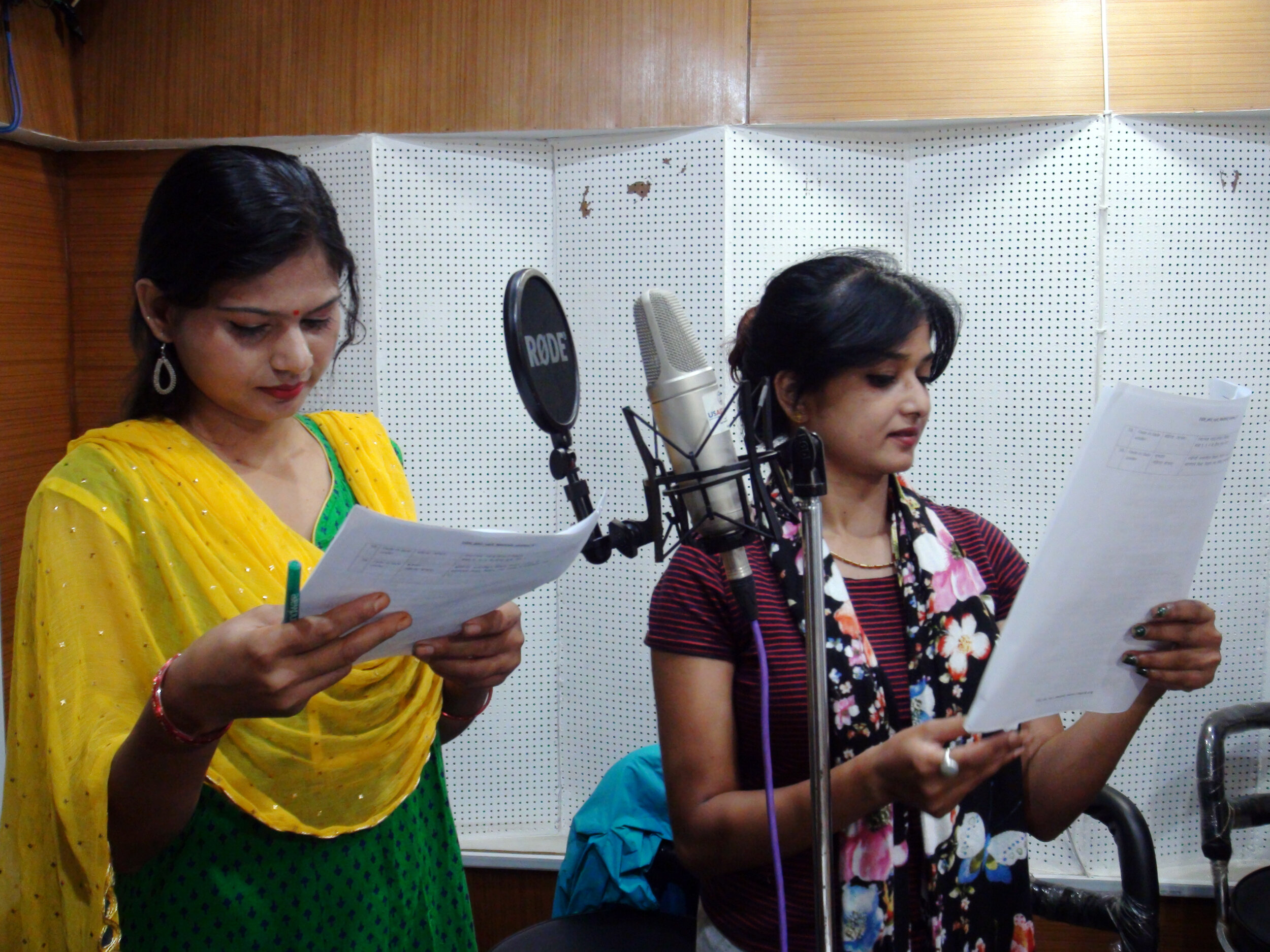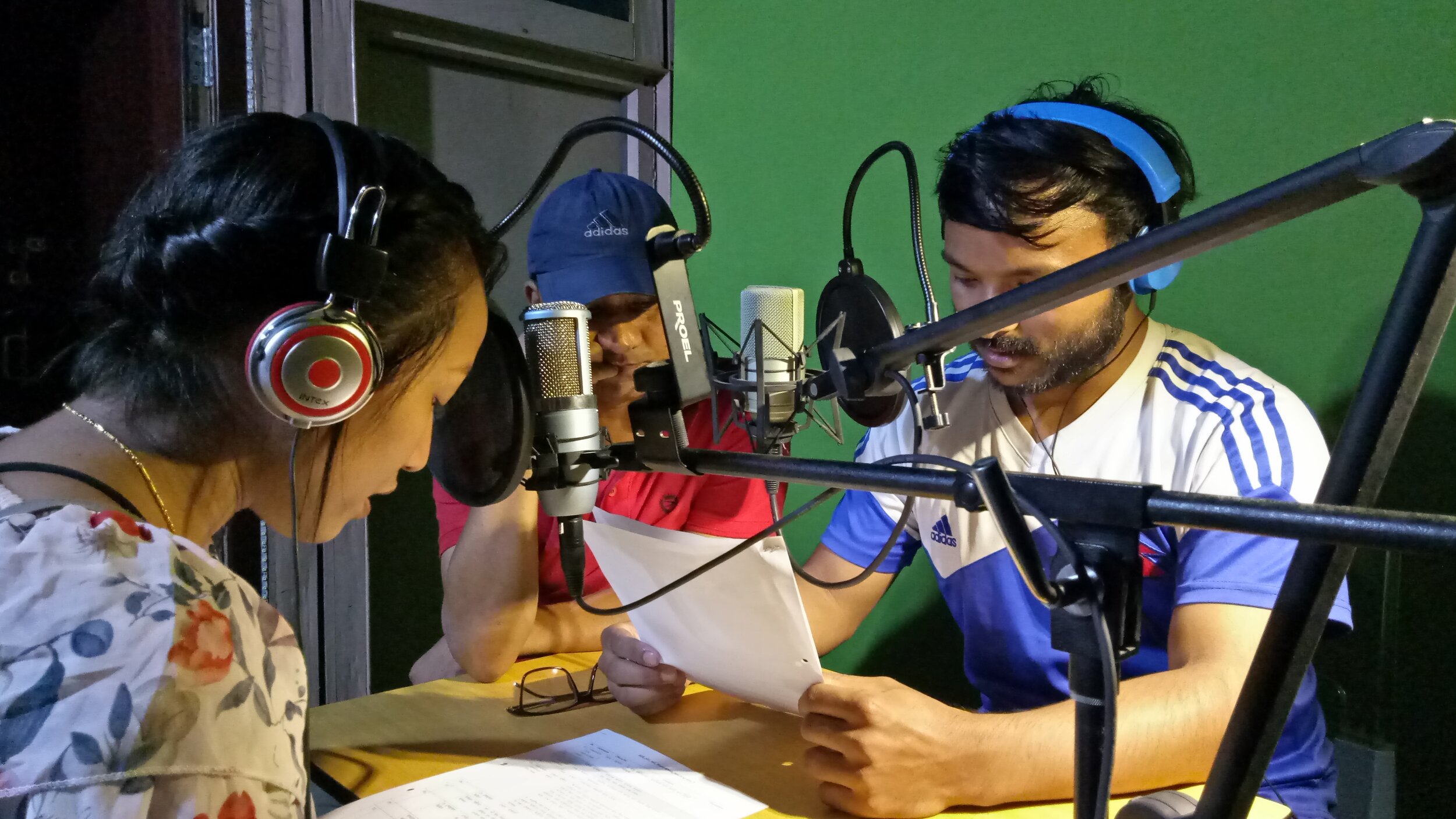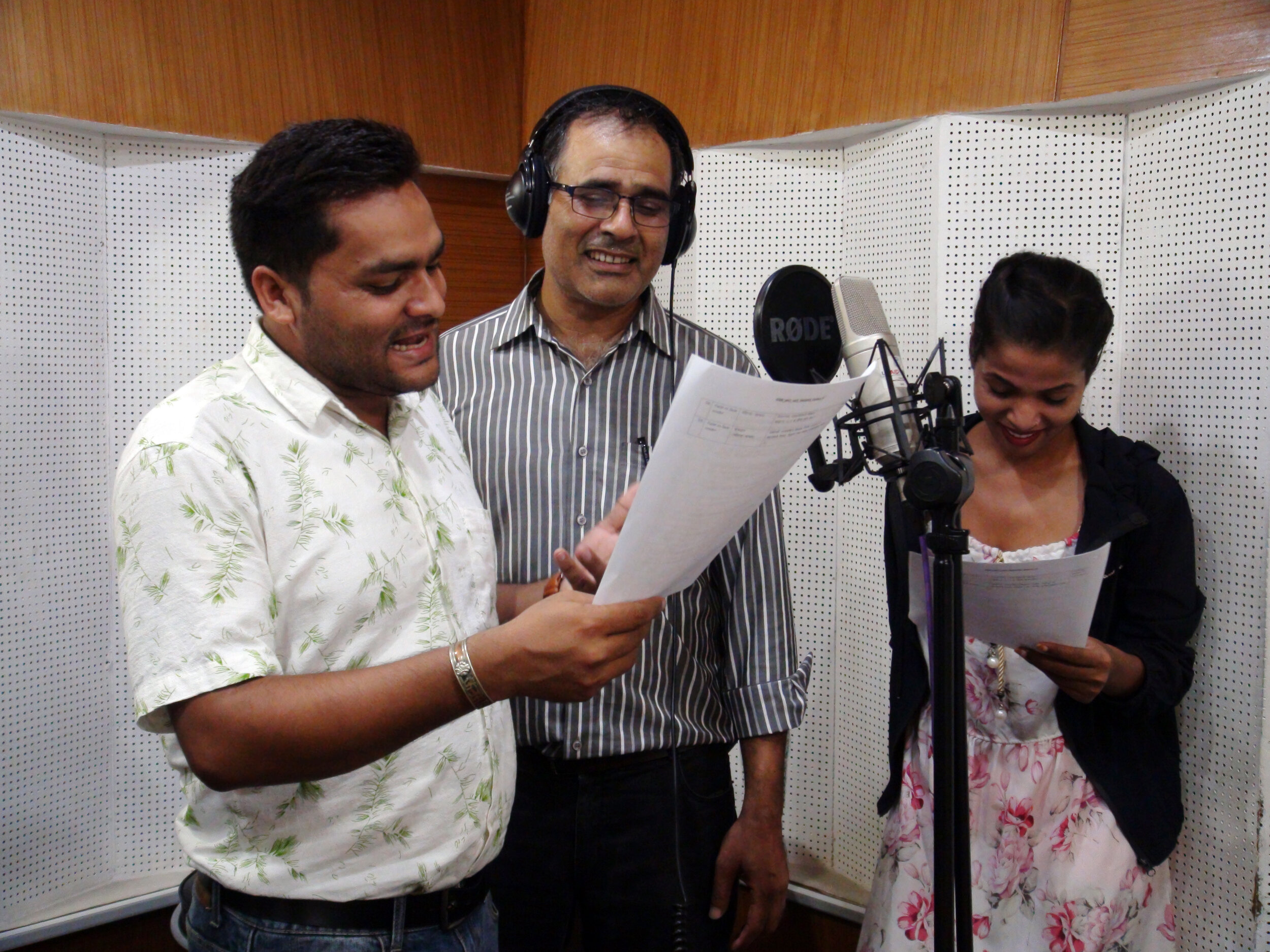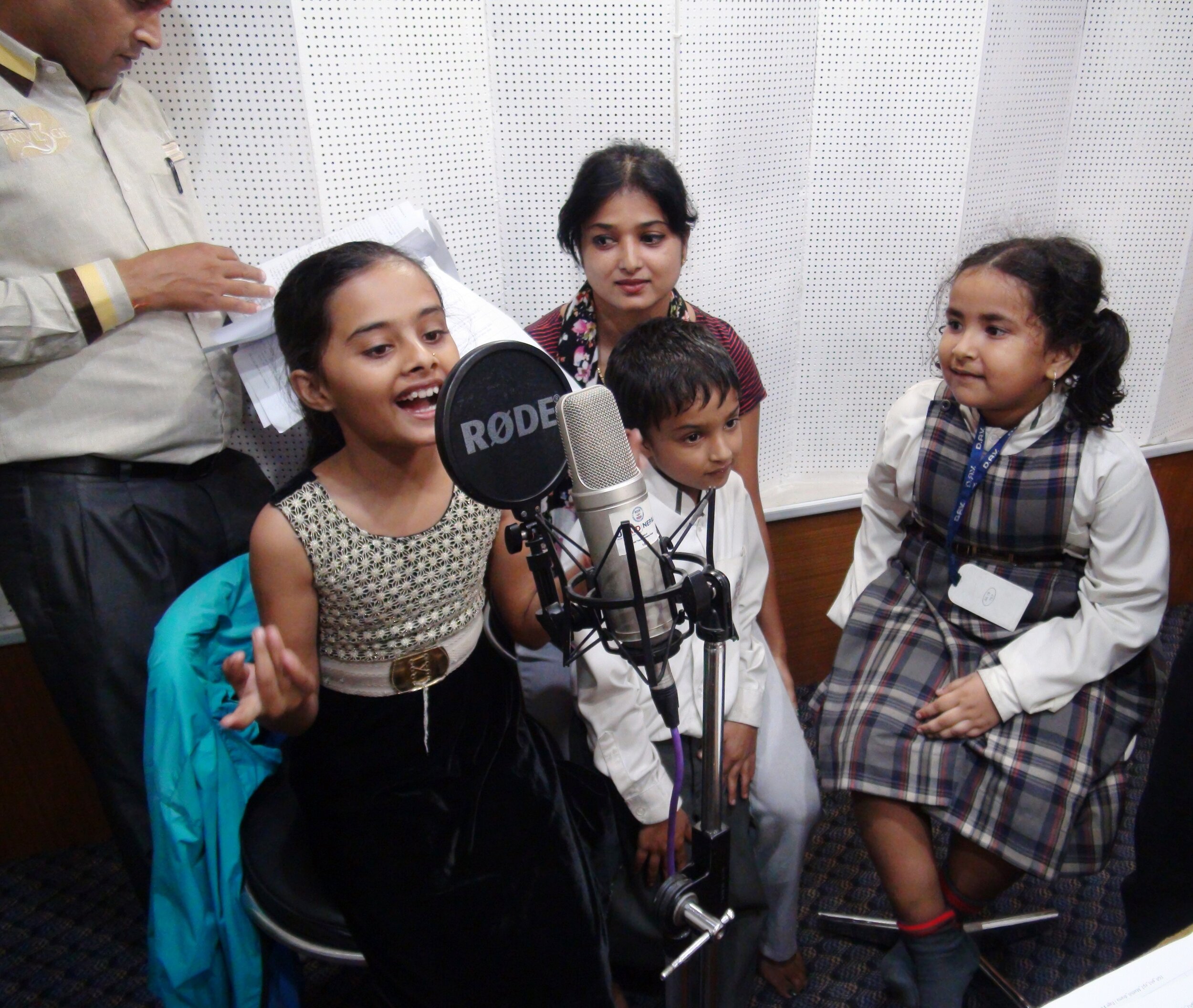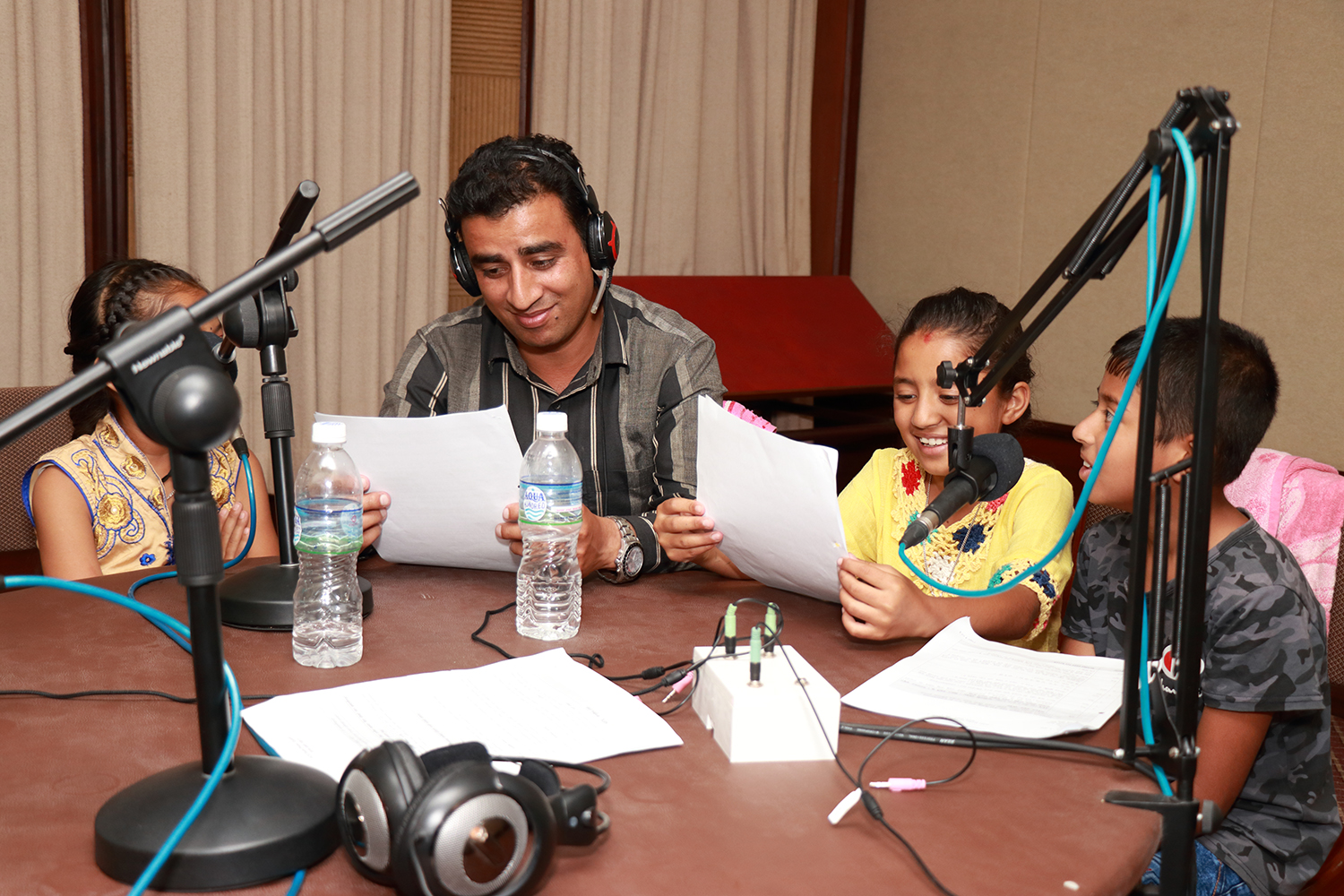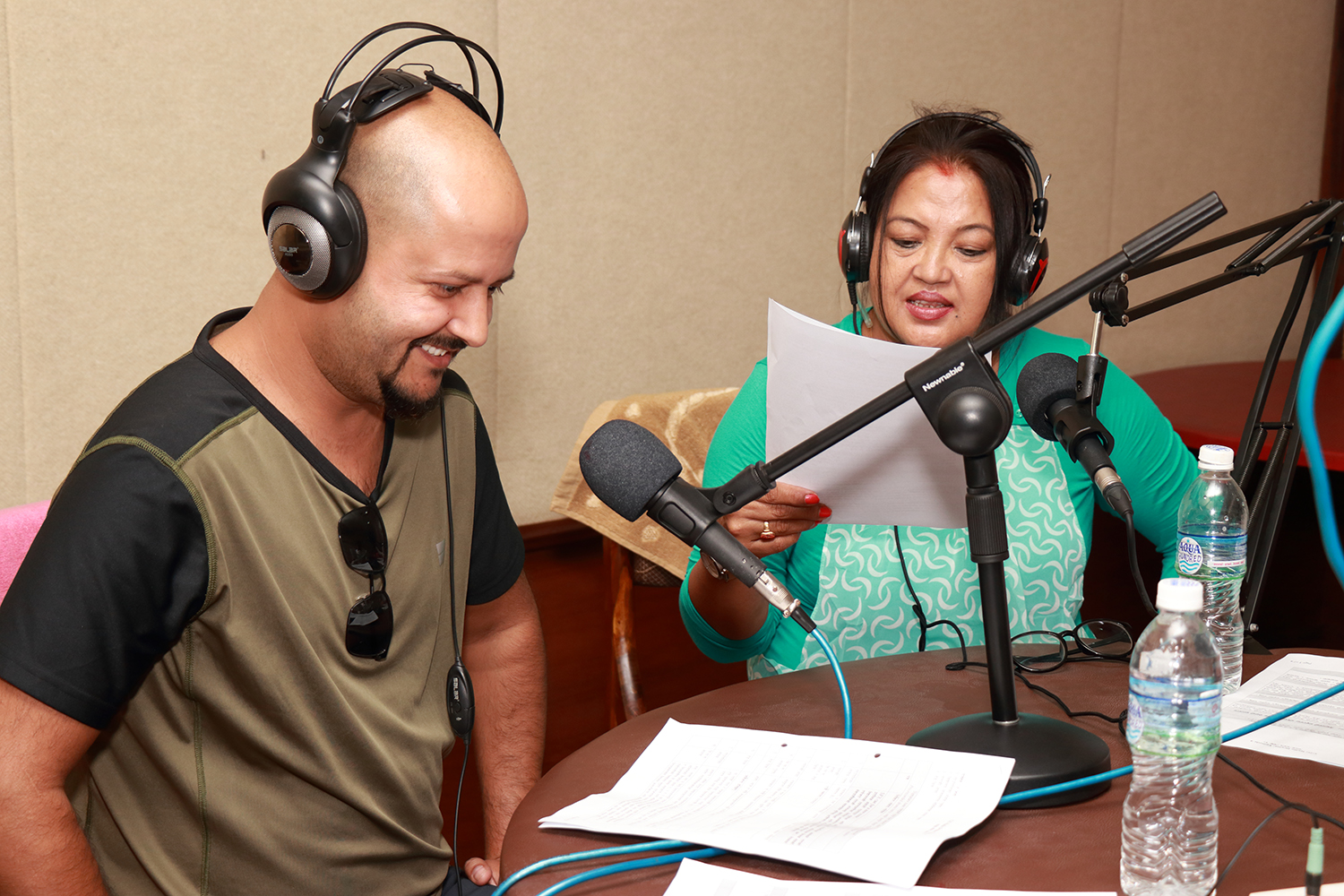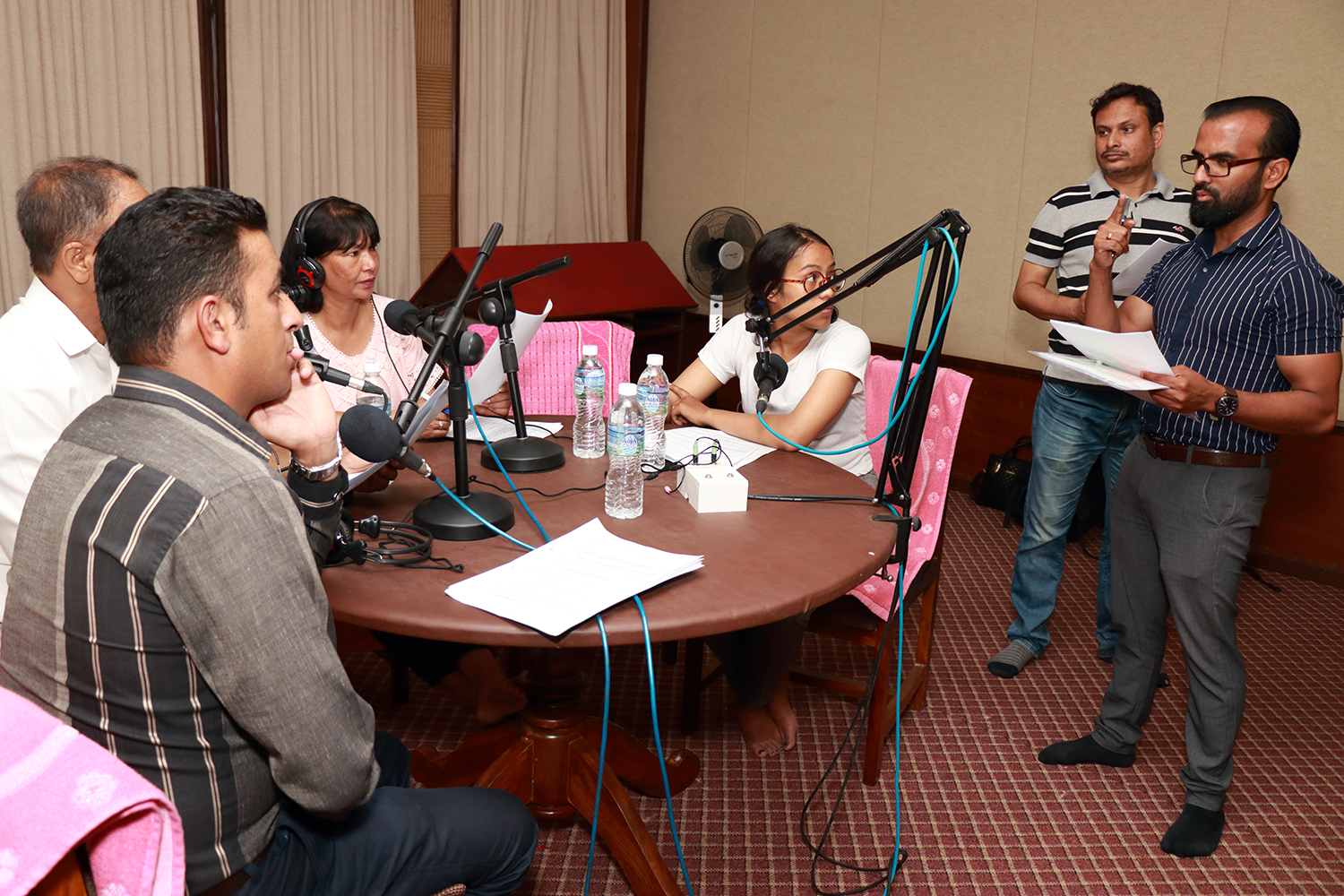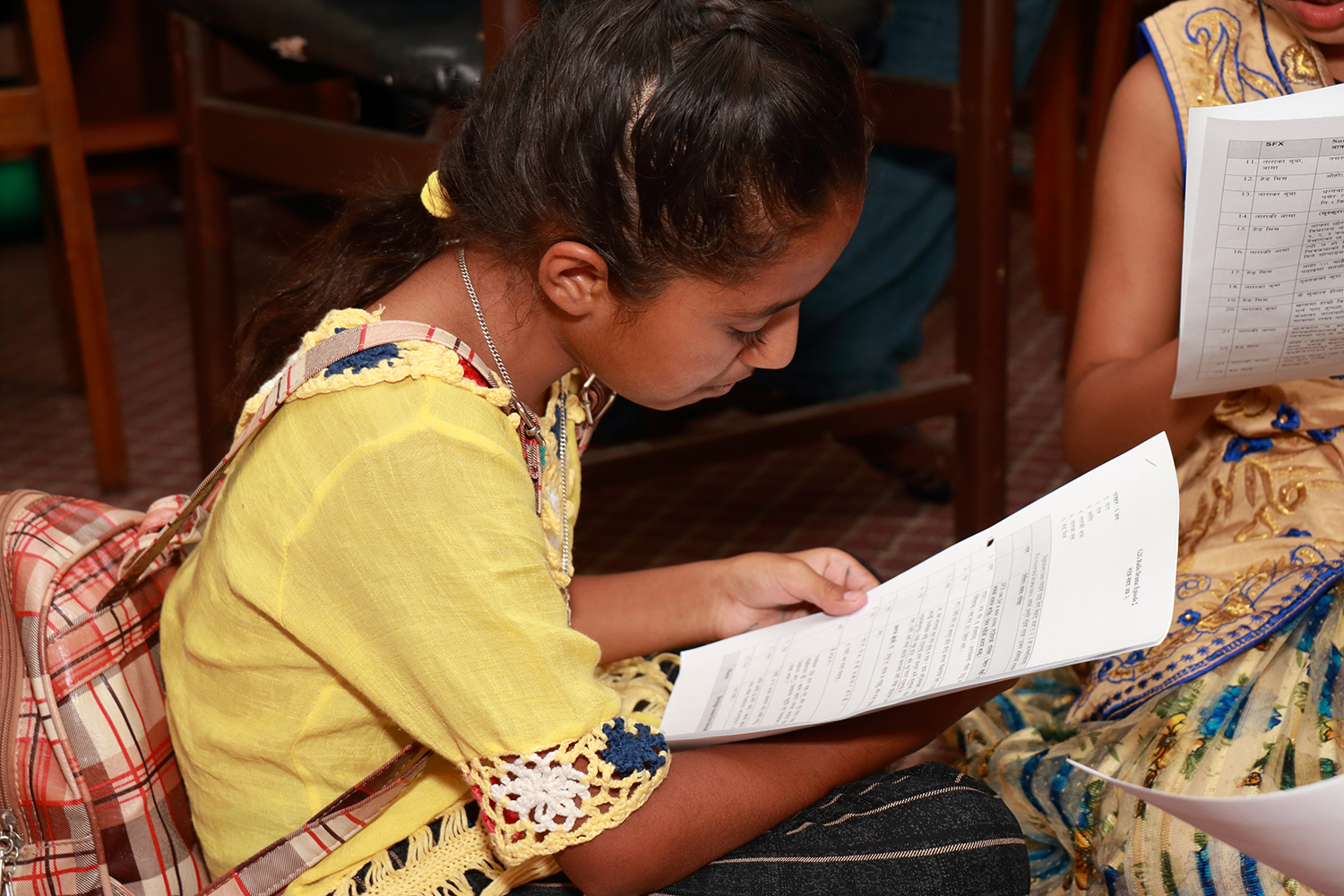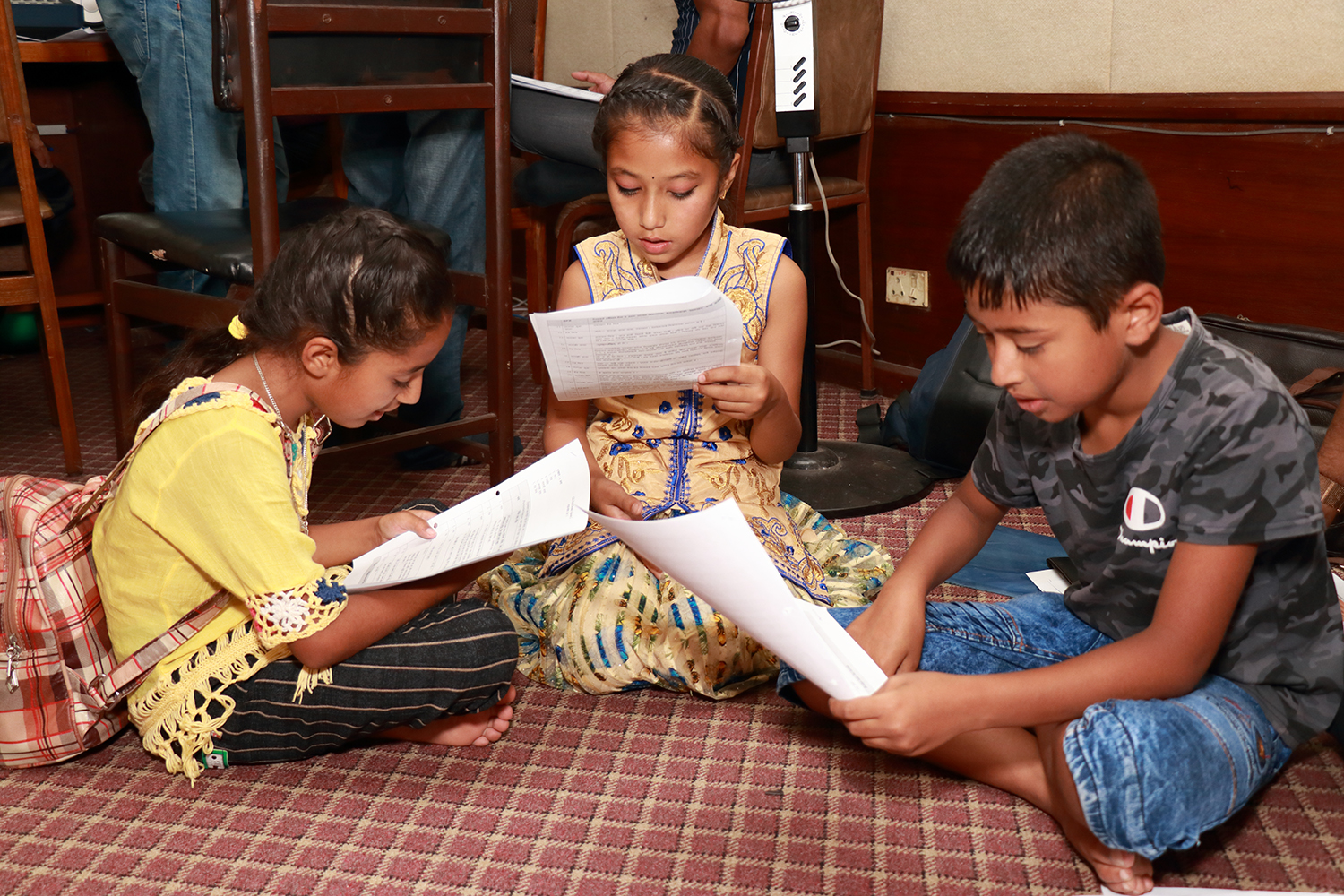The Another Option team on the ground in Nepal has just recorded additional public service announcements in two more languages, Newari and Maithili. The PSAs support our ongoing work on the USAID/Nepal’s Early Grade Reading Program (EGRP).
Another Option records new Public Service Announcements in Nepal
Another Option just recorded several new public service announcements as part of our ongoing work on the USAID/Nepal’s Early Grade Reading Program (EGRP). The radio spots were developed in close partnership with Nepal’s Ministry of Education. The PSA’s will be broadcast in several languages on radio across ten districts in Nepal.
World Reading Day is April 23
To celebrate the day, USAID Read Liberia has produced three Public Service Announcements that are airing in the six counties where the early grade reading activity is working. Each PSA's includes the voices of Peaches, a Hipco musician and rapper, Christopher Jackson, a football player on the Liberian National team, and Teah Dennis, also a football player on the Liberian National Team.
On the recordings, the group shares why reading has been important for their successful careers and what simple actions parents can do at home to help their children to learn to read.
Produced by Accountability Lab in Liberia, the PSAs were approved by USAID and the Liberia Ministry of Education.
Another Option is in the studios in Nepal!
Our Nepal-based team, led by Prabodh Acharya, is in the recording studio this month to create public service announcements (PSAs) to share the importance of early grade reading in ten additional local languages, at the request of the Government of Nepal.
Another Option’s work in Nepal supports USAID’s Early Grade Reading Program (EGRP). The five-year, $53.8 million project supports the Ministry of Education to improve the foundational reading skills of Nepali primary school students in grades one through three.
Parent Peer Education Participate Guide published for Early Grade Reading in Liberia
Research shows that barriers to education, parental aspirations, and societal norms are similar across the world and do not change that dramatically—whether you are in West Africa or South Asia. Another Option has been working in early grade reading for four years in Africa and Asia under several USAID-funded awards.
As part of the USAID Read Liberia project, our technical experts have just published two guides for peer educators and lead trainers working across Liberia to promote early grade reading. These guides were vetted through a series of focus groups to ensure that they were relevant to parents and caregivers in urban and rural communities across Liberia. One major component of making the two documents accessible to Liberian parents and caregivers were illustrations by local artist Brima Wolobah which show real life situations that parents can use to talk about reading with their peers or support their child’s learning.
These materials are available for download and may be adapted for use with attribution, under Creative Commons Attribution. Specific requirements for reuse can be found within each document.
Early Grade Reading Project Public Awareness Report Published
To support Another Option’s ongoing work promoting Early Grade Reading in Nepal, the Social and Behavior Change Technical team for the RTI-managed and USAID-funded project designed a national study to measure awareness of key messages and behaviors related to early grade reading. In partnership with various branches of the Government of Nepal, the study used a mixture of quantitative and qualitative methods to interview families about their beliefs and behaviors related towards reading and their children.
Overall key findings identified that 57.1% parents and 81.9% teachers had listened to radio PSAs published by Another Option, and 39.1% parents and 50.5% teachers had listened to the radio program “Ramailo Padhai, Digo Sikai” (in English, Reading is Fun). Significant numbers of parents and teachers could recall key messages from the materials as well.
The full report is available here for download.
New Training for Peer Educators in Nepal
June kicked-off with the expansion of USAID’s Early Grade Reading Program in Nepal into ten new districts in the country. Another Option brought together 94 recently designated regional mobilization officers and representatives from ten community-based organizations for a ten-day training on promoting key behaviors for peer networks of parents to promote early grade reading.
Prabodh Acharya and Sangeeta Lama, Another Option’s technical leads in Nepal, conducted the orientation using the Peer Education Interpersonal Communication Module. The training guide, created previously by Another Option for this project, orients parents to key behaviors they can adapt in their home and community to promote early grade reading. These behaviors range from setting aside ten minutes a day for a child to read out loud, to preparing a special place for the child to study in the home. The training also encourages parents to strengthen their relationships with their children’s teachers through active participation in parent-teacher meetings and dialogues.
Previous graduates of the Another Option peer training attended this workshop to share their experiences implementing lessons learned and to encourage the newest trainees to utilize the training in their daily interactions not only with community members, but also within their own children’s lives.
At the end of the workshop, each newly trained organization received a copy of the Peer Education Interpersonal Communication Guide, a poster with key behaviors and prompt cards to initiate dialogues with parents around early grade reading.
Nepal Early Grade Reading Program Report
USAID/Nepal’s Early Grade Reading Program (EGRP) has an emphasis on Social and Behavior Change activities, including advocacy, medium mass media, radio program and media orientation. This report was prepared by EAN, a Nepal communication agency that worked with EGRP. It documents the program, which was conducted in six districts in Nepal.
Early Grade Reading: Adapting to Cultural Context
Another Option has been working in early grade reading for four years in Africa and Asia under several USAID-funded awards. Research shows that barriers to education, parental aspirations, and societal norms are similar across the world and do not change that dramatically—whether you are in West Africa or South Asia.
As part of the USAID Early Grade Reading Program (EGRP) in Nepal, we’ve provided technical support in early grade reading Social and Behavior Change. We’ve worked closely with the Government of Nepal stakeholders including the Department of Education and the National Center for Education Development to design and develop materials for parents and caretakers, teachers, and education officers to support early grade reading. Developed resources including a peer education module for parents and an interpersonal communication toolkit for teachers to bridge communication gaps with students’ parents.
In Nepal, we worked very closely with the government of Nepal to design and create all of our materials. And, we’re really pleased that the teacher training guide has been accepted by the government of Nepal as part of its national teacher training curriculum.
Because the social mobilization and interpersonal communication have shown results in Nepal, we wanted to test these materials in Liberia to see if they could be adapted to the Liberian setting and its needs for our work with USAID Read Liberia.
With permission from the Liberian Ministry of Education to pre-test the peer education materials, we set out to answer three critical questions: do parents understand the content (particularly the graphics and illustrations); was the guide culturally sensitive; and would it resonate with Liberian parents of young readers.
We conducted an assessment with twenty-one parents-twelve women and nine men-in two communities – one urban and one rural—at Slipway Public School and King’s Farm Public School. We found that the barriers to education and aspirations were similar to parents and teachers in our Nepal-based early reading program. Parents we interviewed in both places cited factors related to economics, social norms, existing education infrastructure, and gender as real challenges in their attempts to ensure their children received a decent education.
An illustration showing a girl reading to her family in a typical Nepali home.
The Liberian parents overall did relate to the illustrations that were developed for Nepali parents, and that the tools were able to generate insightful discussions about the roles of parents in the reading lives of their children both in and out of school. Parents at both of our focus groups said they could see themselves and their challenges reflected in the illustrations.
Parents also provided feedback on specific visual details that Another Option could do to make the resources more relatable to the Liberian context. For example, participants indicated that some of the hand gestures used in the Nepali context varied in their interpretation in Liberia and could confuse the user. They also asked for more illustrations bridging into the community and not just in the school setting to allow parents to see their roles as educators throughout their daily interactions with their children. Additionally, much discussion was held around the differences of the education setting in rural areas versus urban areas and how these could be better portrayed.
Based on these responses, we worked with local illustrators to improve the cultural resonance of the illustrations in efforts to make it more relevant to parents and caregivers in urban and rural communities in Liberia. Additional materials like flyers and posters will be developed for social mobilizers to use during community engagement activities promoting early grade reading. The final Liberian version has been shared with the Ministry of Education and we have received the go ahead to test it in the field across several counties.
An illustration showing a child reading to her family in a typical Liberian household.
With these changes, parents will have specific examples on what they can do to help their children learn to read. These include children reading aloud for ten minutes a day, children having a quiet place to read, and regularly going to school.
In both Nepal and in Liberia the support and guidance from the Ministries of Education were invaluable. The Nepal version is endorsed and carries the seal of the Ministry of Education, and we hope that the Liberian ministry also adds its endorsement to this early grade reading tool.
Rebecca Martinez, who wrote this blog post, is the Program Coordinator for USAID Read Liberia. She conducted the pre-test in partnership with local counterparts on the ground in Liberia.
Early Grade Reading in Nepal – Media Orientation
“My grandfather inspired me to read and always brought me books. Now when I travel, I always remember to bring back books for my children.”
Pushpa Basnet, CNN Hero 2016-17
A young Nepali girl poses with her favorite book during a recent Another Option field visit.
The commitment and resolve of these statements reflect the focus of the media orientation workshop organized by the Department of Education (DOE) and the USAID-funded Early Grade Reading Program (EGRP).
Held on February 6 in Kathmandu, the workshop was the first opportunity for 28 Nepali print and broadcast media journalists to come together and understand the program and their role in strengthening the program. Using presentations and group discussions, Focal Person, Bishnu Adhikari, Deputy Director, DOE and EGRP Chief of Party, Edward Graybill along with other technical team leads, shared strategic ideas about the relationship between EGRP and the government’s National Early Grade Reading Program (NEGRP).
Further, participants received information packets with community mobilization and peer advocacy materials, developed and designed by the program, with the intention to facilitate better communication amongst beneficiary parents and between parents and teachers about children’s reading habit.
“In the 2014 earthquake, houses with strong foundation withstood the damage. Early grade reading is the foundation to improve our children’s future.”
Mr. Baburam Poudel, Director General, Department of Education (DOE)
Mr. Baburam Poudel, Director General, Department of Education welcomed the participants and opened the workshop by reiterating the critical nature of quality early grade reading and stressed all involved stakeholders to work in tandem to improve access, quality and management of primary education.
Education expert, Mr. Dhananjaya Sharma called for teachers and other stakeholders in primary education to encourage two-way interactions with students and to change classroom settings to make it child-friendly among others.
Special guests at the orientation included comments by Ms. Basnet, named as a CNN Hero in 2016-2017. She stressed the importance of reading in her own personal development from a shy student to a confident woman.
Deputy Director Mr. Adhikari spoke at length about the National Early Grade Reading Program (NEGRP) and raised issues about program’s implementation including ownership of the program, lack of technical resources and lack of commitment of policy making and implementation.
“Teaching is all encompassing – it is as cultural, social and familial process.”
Dhananjaya Sharma, Education Expert
A key message that came out of the interaction between the journalists and the EGRP and the government teams was that a strong sense of camaraderie and commitment to this important work was required from all stakeholders to implant the love for reading in Nepali children from the very early grades.
A similar workshop will be organized in Bhaktapur, Kaski, Banke, Saptari and Kanchanpur districts in February and March
This blog was prepared by Adheep Pokhrel, Communication Manager for USAID/Nepal’s Early Grade Reading Program managed by RTI International


